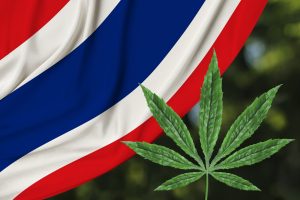Two years after becoming the first nation to legalize the use of marijuana for medical purposes, Thailand has taken another step toward becoming the first Southeast Asian nation to decriminalize the drug. Yesterday, Public Health Minister Anutin Charnvirakul signed a ministerial announcement officially removing cannabis and hemp from Category 5 of the country’s list of narcotics.
At a signing ceremony, Anutin, who has spearheaded Thailand’s push for decriminalization since his Bhumjaithai Party made legalization of cannabis a key campaign promise at the 2019 election, expressed hopes that the move marked the beginning of a “new history for cannabis” in Thailand. “Cannabis actually has plenty of medical benefits, not different from other herbs, and we are trying our best to make the Thai people enjoy both medical and economic benefits from it,” the minister said.
While Thailand legalized marijuana for medical purposes in 2020, the law only permitted the use of cannabis oil for treatments. But according to the Associated Press, yesterday’s delisting, which will enter into effect 120 days after its publication in the Royal Gazette, means that all parts of the marijuana plant, including its flowers and seeds, can legally be consumed in Thailand. However, the extracted content will remain illegal if it contains THC levels above 0.2 percent. THC, or tetrahydrocannabinol, is the psychoactive ingredient of cannabis.
Of course, Anutin is no pro-legalization radical. His agenda is less to legalize recreational use of marijuana than to promote the plant’s medicinal use and to generate a commercial industry around serving this medical demand.
As a result, under the new rules, the production and sale of the herb will remain regulated and it will still be against the law to grow and consume marijuana. Anutin said that a bill on cannabis and hemp will be submitted to parliament in order to clarify the exact regulatory framework around its production and sale.
Nonetheless, the removal of cannabis from Thailand’s list of Category 5 narcotics, which also includes opium, marks an important step. As I wrote in this month’s edition of The Diplomat magazine (subscribe here), the Anutin’s legalization push “represents a bright light of rationality in Southeast Asia, where most nations have intensely punitive anti-drug regimes that draw little or no distinction between marijuana and harder drugs.”
The legalization move is also seemingly out of character for the reactionary administration of Prayut Chan-o-cha, which came to power in a coup in 2014 and has been anything but liberal. Prayut’s administration has shown no quarter to a wave of youth-led pro-democracy protests that have called for democratic political reforms, and it has been famously intolerant of criticism. Put simply, this is not an administration that one would expect would be tolerant toward the use of cannabis – but it is relief to see Thailand moving forward on at least one issue on Prayut’s watch.

































